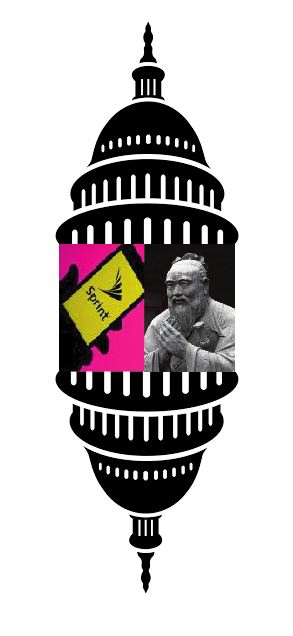

The philosopher Confucius was reportedly once asked what he would do if he were a governor. He responded that he would first "rectify the names" to make words correspond to reality, for "If language be not in accordance with the truth of things, affairs cannot be carried on to success, proprieties and music do not flourish."
I'm not precisely sure what the ancient Chinese sage meant by that, or what examples he may have had in mind, but I've thought one possible interpretation of this quote is that language must not be allowed to be abused in such ways that speech grows full of dishonesty and contradictions, or else there won't be a basis for efficient human action. Perhaps a kind of social equivalent to how free market economists talk about State central planners not being able to efficiently run an economy because they do not have access to accurate price signals.
These thoughts were provoked by an ad for Sprint cellphone service that I heard earlier this evening. In the ad, a man comes on and says something along the lines of, "Oh great, another wireless ad. You're probably sick of all these phone ads with all their confusing terms about their networks and offers and blah blah blah. But Sprint is going to do something different." Then he quotes a monthly price and basically says if you don't like it after a month you can have 100% of your money back, guaranteed. A few more details are conveyed in a similarly reassuring tone.
Following which, a different male voice comes on, speaking quickly in a style that broadcasters render even less comprehensible by digitally chopping down the length of the micro-pauses between the sounds that come out of a person's mouth. It proceeds to describe all kinds of additional confusing terms and details, delivered at a speed that probably no one hearing the ad other than possibly some kind of genius or person with autism could comprehend and recall after hearing it.
Essentially, the second part of the ad tells you the first part of the ad is mostly bullshit, but trusts you won't notice because it is spoken in a different language. It consists of all the gobbledy-gook legalese (I can use gobbledy-gook as an adjective, can't I?) designed to counteract whatever risks the lawyers believe may have been incurred as a result of the misleading, sugar-coated, feel-good language in the first part of the ad. It's hard to say which part feels more socially dysfunctional or alienating. What is an honest listener to conclude about the product being sold or the people who make it?
As an allegory, I imagine these folks as modern witches and warlocks reciting rote spells to ward off curses or protect themselves from demons who demand this ritual obeisance (these demons might bear a resemblance to Uncle Sam if not to particular politicians): "As long as we stay within the protection of the magic circle of this particular phrasing, and accompany our supplication to buy with these powerful words of legal magic, we can harness the forces of evil to aid us in our dark arts of deception!"
The forces of evil being the threat of government aggression, which though aimed in this case at deceptive advertisers ("Don't act in ways we officially label as dishonest or we'll steal from you"), can by skillfully channeled by learned and cunning advertisers or their lawyers to instead shield their own dishonesty from the natural consequences of their quasi-fraud ("Your honor, this defamatory article about our company is libelous – our ad was in full compliance with all the legal requirements").
Without the aggression-funded attempts by government to control advertiser speech in the name of reducing predation, what would ads be like? I think they'd tend to be shorter and less confusing, for one thing. Not that some advertisers wouldn't still attempt to manipulate and mislead, but giving official license to whatever you can get past the byzantine rules of government regulators may tend to fuel a kind of arms race in coming up with the kind of unnecessarily tortured, confusing, and self-contradictory advertising language that might have impressed Rube Goldberg.
Aggression isn't an evil felt only by its direct victims. It's a form of spiritual pollution that tends to make dishonest everything it touches. Euphemisms become widely used for political reasons (e.g. taxes being called "investments" rather than "theft"). People lie to avoid paying those taxes, on a myriad of other required forms, to get out of forced jury labor, and for myriad other government-induced reasons. Empty professions are commonplace ("In God we trust"; "I swear to protect and defend the Constitution"; "Your call is very important to us", etc.). Trust levels have been found to be lower in highly statist societies such as under self-identified communist regimes, and why shouldn't this be so? It's said that truth is the first casualty of war, and what is war but the most direct and unambiguous manifestation of the State?
Confucius may not have perceived the State and its mandates as a major source of dishonesty in language, but regarding the rectification of names I think he was onto something.
